UK storms: Mother killed by falling masonry named
- Published
The incident happened near Holborn Underground station, as Jean Mackenzie reports
A mother-of-three who died when falling masonry hit her taxi has been named.
Julie Sillitoe, 49, was one of two people killed on Friday as strong winds and heavy rain hit southern England, adding to problems already caused by widespread storms and flooding.
An 85-year-old man died after a freak wave hit a British cruise ship in the English Channel.
The BBC's Chris Buckler reports on destruction caused by the storm
More than 65,000 homes remain without power and severe weather warnings are in place, external for much of the UK.
Prime Minister David Cameron chaired the government's emergency committee, Cobra, on Saturday.
Mrs Sillitoe, from north London, died after her minicab was crushed when part of a building collapsed on to it at about 23:00 GMT on Friday, near Holborn Underground station, in central London.
Her next of kin have been informed. Her passengers, a 25-year-old man and 24-year-old woman, were taken to hospital with non life-threatening injuries.
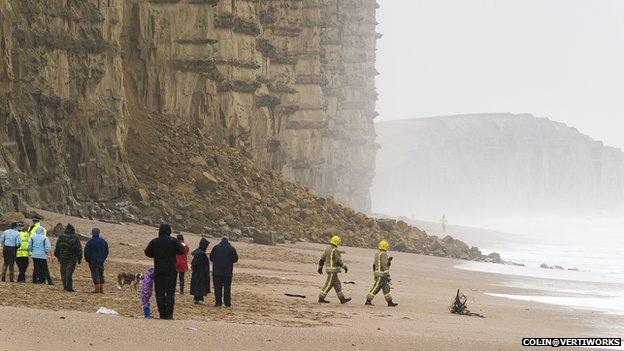
Part of a cliff has collapsed at West Bay in Dorset
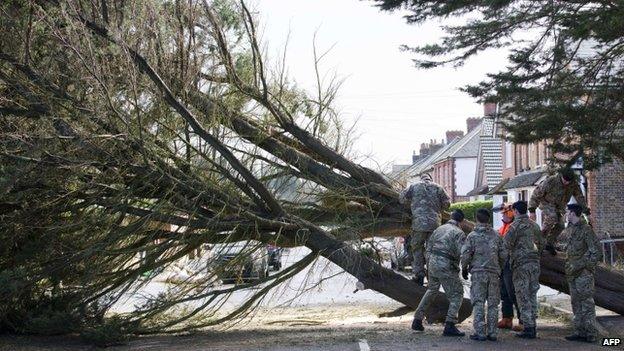
The Army was called in try to move a fallen tree blocking a road in Egham, Surrey
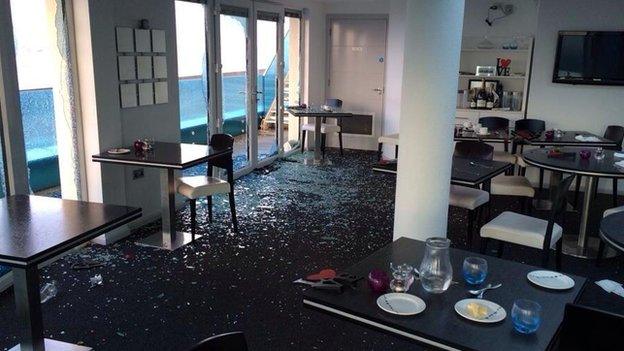
Windows on both the ground and first floors were smashed by flying shingle at the Marine Restaurant in Milford on Sea
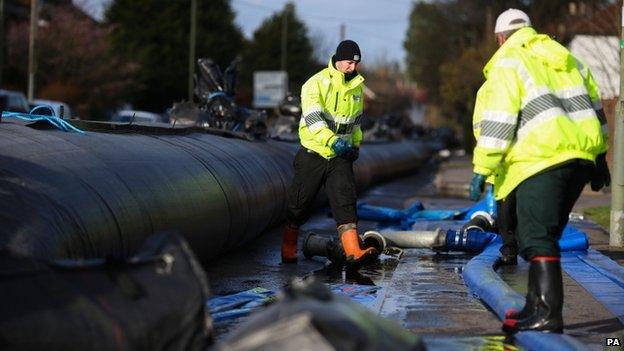
An aqua dam is employed to hold back flood water in Chertsey, Surrey
Elsewhere an 85-year-old man died after waves crashed through a window of the cruise ship, MS Marco Polo, as it headed for its home port of Tilbury in Essex.
He and a woman in her 70s had been airlifted off the ship but he later died.
Meanwhile a third storm victim Bob Thomas, 77, died in hospital on Friday, two days after he was hit by a falling tree in his garden in Caernarfon, north-west Wales.
Speaking after Saturday's Cobra meeting, the prime minister warned flood levels would remain "very high" and in many places would continue to rise, despite an improved weather forecast.
"I was reassured that all the agencies involved - thousands of people locally and nationally - have made huge efforts over last few days to protect more homes and businesses, with over 3,000 of our troops deployed on task tonight and many hundreds more on standby".
Tim Field, from the Energy Networks Association, said engineers will be working through the night in a bid to reconnect homes without power. He warned some will still be without power on Sunday.
UK 'sleepwalking'
In an interview with the Observer, Labour leader Ed Miliband said the events of recent weeks showed climate change was a "national security issue" for the UK.
He said Labour had warned climate change could destabilise "entire regions of the world" and now Britain's homes, businesses and livelihoods were "under attack".
"The science is clear. The public know there is a problem. But, because of political division in Westminster, we are sleepwalking into a national security crisis on climate change," he said.
BBC weather presenter Susan Powell said parts of the UK could expect a "breather" on Saturday night and she expected next week's wet weather to be much less "aggressive".
A yellow "be aware" weather warnings of icy driving conditions will be in effect until 10:00 GMT on Sunday for most of the UK as temperatures drop.
Winds have dropped across much of the UK, after gusts of up to 83mph (130km/h) - combined with ongoing problems due to flooding - caused major disruption to roads and railways.
There was a "large" cliff fall at West Bay, Dorset but Portland Coastguard said there had been no reports of anyone injured.
The Environment Agency has 16 severe flood warnings, external - meaning "danger to life" - in place, as well more than 140 flood warnings and more than 200 flood alerts in England and Wales.
In Milford on Sea, Hampshire, the Army had to be called in to help emergency services rescue 32 people at the beachfront Marine Restaurant after wind-blown shingle smashed windows and a tidal surge flooded the ground floor.
Conditions were described as "extremely dangerous" but police said there had been no serious injuries in the incident.
The Ministry of Defence (MoD) said more than 3,000 servicemen and women were committed to helping the flood relief effort with "thousands more at a state of high readiness", if requested.
In other developments:
The Environment Agency said river levels were expected to rise and stay high for several days
The Thames Barrier has been closed for the 16th consecutive high tide, setting a new record. The barrier is meant to stop high tides pushing water back up the river
About 50 soldiers were called in to help police and the Highways Agency shore up a section of the M50 motorway embankment near Ledbury, Herefordshire
Overall, about 2,200 armed forces personnel - regulars and reserves - are helping the flood relief effort and a further 3,000 are on stand-by to respond within two hours
London Fire Brigade said its staff were working "around the clock" to prevent flooding of Kenley water treatment works, near Purley in Surrey, which supplies 47,000 properties
Seventeen people were evacuated from flats at Barry in the Vale of Glamorgan after part of the roof blew off
New research suggests the jet-stream that determines the weather over Northern Europe and North America may be changing
Many roads have been affected by wind or flooding. See BBC Travel News for the latest information
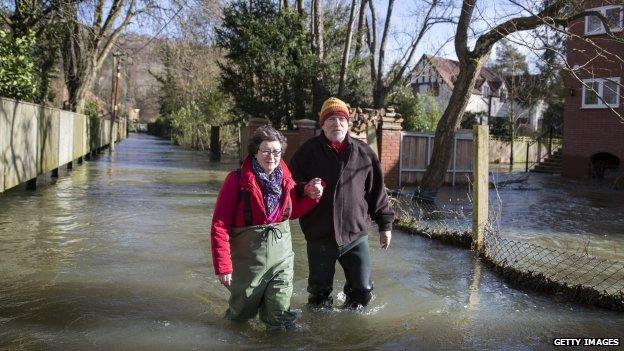
Residents walk along a flooded street in Henley, Oxfordshire
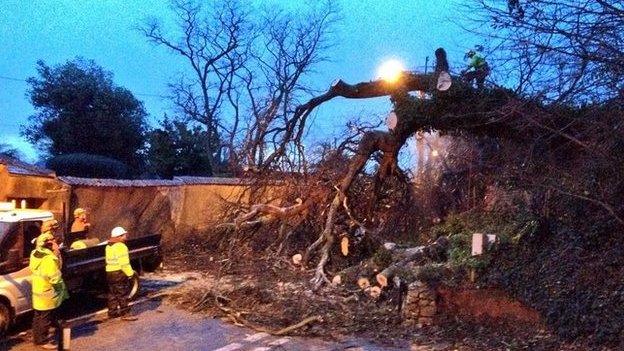
Contractors are working to remove a huge oak tree which has closed the main A379 near Starcross in Devon
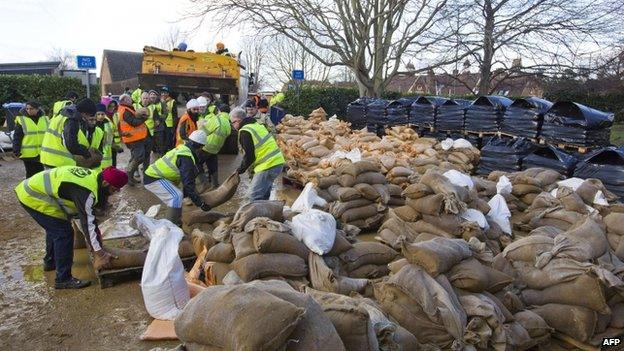
Volunteers have been filling sandbags in Egham, Surrey
There are major problems on many rail routes, external, with Devon and Cornwall worst affected and many services in the two counties suspended altogether.
Network Rail has said more than a dozen train lines have been reopened today after Friday night's storm brought down more than 150 trees across the south of England.
The already devastated train track in Dawlish, Devon, also suffered more damage with a further 10 metres of the sea wall destroyed.
Are you in the affected areas? Have you been affected by the flooding? Email us at haveyoursay@bbc.co.uk with the subject heading UK weather.
